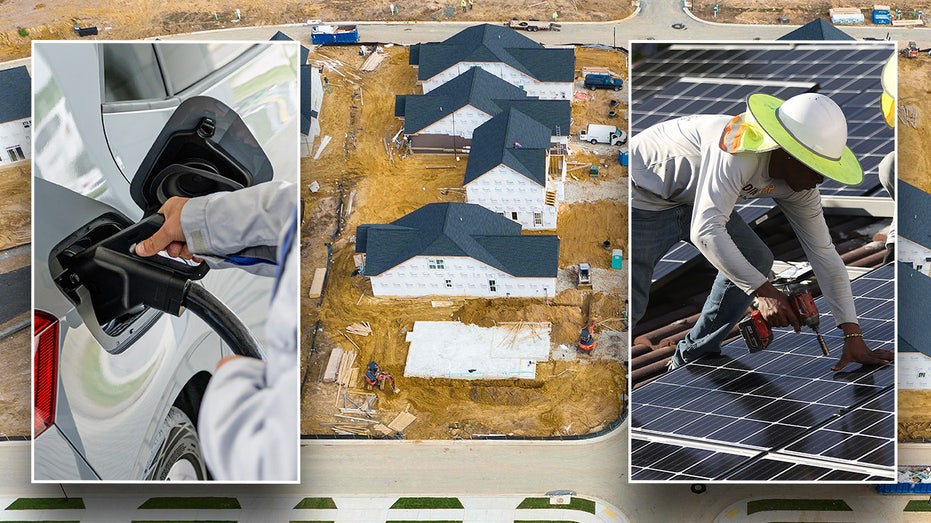An international organization that develops model codes and standards for new construction is quietly preparing an energy conservation code that opponents argue is a backdoor climate initiative and will lead to higher home prices.
The International Code Council (ICC) — a Washington, D.C.-based group that regularly issues more than a dozen codes regulating new construction and impacting billions of people worldwide — is expected to finalize its 2024 International Energy Conservation Code (IECC) early next week. While previous IECCs received little opposition, the 2024 version has been widely criticized for prioritizing climate initiatives over energy efficiency.
“They’re incentivizing electrification and discriminating against the natural gas industry by excluding it from being part of the code,” Karen Harbert, the president and CEO of the American Gas Association (AGA), told Fox News Digital in an interview. “That really is anticompetitive behavior.”
“If you are about energy efficiency, you should say, ‘We are about energy efficiency however you get there’ — being fuel neutral. But in this case, they are prescribing the way to get there, and it only includes electrification.”
BIDEN INVOKES WARTIME POWERS TO FUND ELECTRIC HEATERS AS HE CRACKS DOWN ON GAS APPLIANCES
AGA, whose members provide natural gas service to 180 million customers nationwide, has argued in recent months that the ICC developed its 2024 energy efficiency code with “serious lapses in due process” by not involving them. It further said the code would harm consumers and lead to higher costs.
The leading gas industry group, other energy industry associations, housing groups and the ICC’s own Northeast regional branch filed appeals in late December and early January asking for a revision to the 2024 IECC. However, the ICC’s appeals board recommended this month that those appeals be rejected, leaving the group’s board of directors with the final decision. That’s expected to come Monday.
EXPERTS WARN BIDEN ADMIN’S WATER HEATER CRACKDOWN WILL HIKE PRICES, REDUCE CONSUMER CHOICE
Among the provisions opposed, the draft IECC, which has been in development for years, requires new one- and two-family dwellings and townhouses to install electrical infrastructure for home electric vehicle chargers. It also mandates that new homes are equipped with the electrical wiring needed for a solar panel system and all-electric appliances.
According to the AGA, those measures and other provisions were largely included in the IECC as part of an omnibus package in September 2022 after rejection through the normal process.
“The activists that are supporting an all-electrification agenda tried to come in through the policy front door, which was to ban natural gas in cities, and that got overturned in the Ninth Circuit,” Harbert told Fox News Digital. “They tried to ban gas at the state level, and that’s now being challenged. And they have tried to do it through regulation and have been unsuccessful.”
“So, you go to a process that is very much under the radar, very wonky, very technical, but with the same objectives,” she continued, referencing the IECC process. “You come in the front door, you come in the side door, now you’re coming in the back door.”
In addition to AGA, the American Public Gas Association, the appliance manufacturer trade group Air Conditioning, Heating, and Refrigeration Institute, the Building Owners and Managers Association (BOMA) and the National Multifamily Housing Council (NMHC) also filed appeals to the 2024 IECC.
BIDEN ADMIN LAUNCHED AN AGGRESSIVE CAMPAIGN TARGETING HOME APPLIANCES WITH ECO REGULATIONS IN 2023
“As long-standing supporters of the ICC codes and standards, we are concerned that this version of the IECC misses the mark,” Paula Cino, NMHC’s vice president for construction, development, land use and counsel, told Fox News Digital in a written statement.
“Without action from the ICC Board to cabin provisions that exceed the bounds of the code, this IECC would threaten housing affordability and weigh renters down with costs for unwanted or unusable technologies,” she added.
In its December appeal filed jointly with BOMA, NMHC particularly criticized the IECC’s electric vehicle charging provision and another provision requiring new homes to have so-called demand responsive controls for water heating equipment, allowing a third party to reduce a home’s energy consumption in times of high demand. NMHC and BOMA argued that the 2024 IECC would place additional costs on Americans, including low-income families.
And the ICC’s Region IV branch, which covers the Northeast, also warned of the potential negative economic consequences of the 2024 IECC.
Overall, jurisdictions across 48 states and representing more than 119 million Americans administer the IECC. ICC CEO Dominic Sims said late last year that the code is an essential tool for “achieving energy efficiency and greenhouse gas reduction goals.”
“The model building energy code before the International Code Council represents a consensus agreement among builders, building code officials, and energy efficiency advocates,” said Jennifer Amann, a senior fellow at the American Council for an Energy-Efficient Economy, which advocates for electrification policies. “It will cut energy waste in new homes, lower utility bills for homeowners, and reduce pollution.”
“The International Code Council’s board should approve this commonsense proposal and not bend to special interests representing polluting industries,” she told Fox News Digital.
The debate over the group’s energy conservation code comes amid a broader push from environmental organizations to electrify the residential and commercial sector, which accounts for the largest share of total end-use carbon emissions of any sector in the U.S. Activists and Democrat-led local governments have sought to ban natural gas hookups as part of that effort, replacing gas-powered stoves, water heaters and furnaces with electric alternatives.
At the same time, the Biden administration has implemented a series of regulations cracking down on popular home appliances, forcing them to be more efficient. It has also earmarked $1 billion under the Inflation Reduction Act for grants helping local jurisdictions implement the ICC’s IECC.
The ICC declined to comment and the Department of Energy didn’t respond to a request for comment at press time.
























